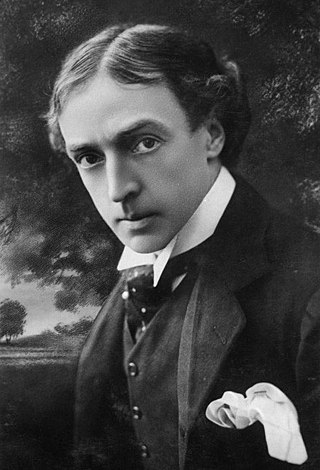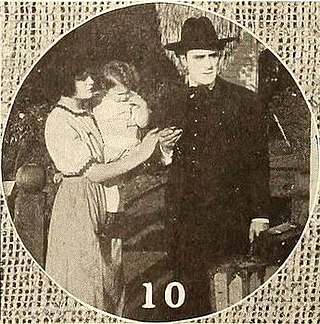Related Research Articles

Sir John Martin-Harvey, known before his knighthood in 1921 as John Martin Harvey, was an English stage actor-manager.

Harry von Meter was an American actor of stage and silent film. He starred in about 200 films in the period from 1912 through 1929. He retired from acting just as sound films were beginning.
A.B. Imeson was an English stage and film actor.

Fern Andra, Dowager Baroness von Weichs was an American actress, film director, script writer, and producer. Next to Henny Porten and Asta Nielsen, she was one of the most popular and well-known actresses in German silent film.

City of Play is a 1929 British part-talkie sound drama film directed by Denison Clift and starring Chili Bouchier, Patrick Aherne and Lawson Butt. It was made by Gainsborough Pictures and produced by Michael Balcon. The film featured a few sequences with dialogue and singing while the remaining film used English intertitles along with a musical score and sound effects.
Fred Raynham was a British actor of the silent era.
Wilfred Shine was a British actor, mainly on the stage, and a specialist in melodrama. He was the father of the actor Bill Shine.
Cupid in Clover is a 1929 British sound romance film directed by Frank Miller and starring George Wynn, Winifred Evans and Herbert Langley. While the film has no audible dialog, it features a synchronized musical score with sound effects along with a theme song. The film was adapted from the novel Yellow Corn by Upton Gray and made at Isleworth Studios in London.
Walthamstow Studios was a British film studio located in Walthamstow, London which operated between 1914 and 1930. Two earlier studios had previously existed in Walthamstow. It was the base of Broadwest films for a number of years, which also used Catford Studios as an overflow facility. It was later owned by British Filmcraft. After the bankruptcy the studios were sold off for non-film use.
The Broken Melody is a sound 1929 British romance film directed by Fred Paul and starring Georges Galli, Andrée Sacré and Enid Stamp-Taylor. While the film has no audible dialog, it features a synchronized musical score, singing and sound effects on the soundtrack. The film was shot at Cricklewood Studios and distributed by Paramount Pictures. It was based on a play by Herbert Keith and James Leader. An exiled Prince living in Paris, begins a daliance with an opera singer before returning to his wife.
Spangles is a 1928 British silent drama film directed by George Banfield and starring Fern Andra, Forrester Harvey and Lewis Dayton. It was made at Walthamstow Studios. A circus girl goes to London and enjoys great success. However, she eventually decides to return home.
George Banfield (1888–1963) was a British film producer and director. He first entered the film industry in 1908. During the mid-1920s he began producing series of short films during the Slump of 1924. In 1926 he formed a new company British Filmcraft, and bought Walthamstow Studios. The company produced a large number of shorts, and four feature films but did not make the transition from silent to sound films. He is sometimes credited as George J. Banfield.
The River of Stars is a 1921 British silent adventure film directed by Floyd Martin Thornton and starring Teddy Arundell, Harry Agar Lyons and Faith Bevan. It was based on the 1913 novel The River of Stars by Edgar Wallace featuring Commissioner Sanders.
Gwyneth of the Welsh Hills is a 1921 British silent romance film directed by Floyd Martin Thornton and starring Madge Stuart, Eille Norwood and Lewis Gilbert. It was based on a novel by Edith Nepean.
The Romany is a 1923 British silent adventure film directed by Floyd Martin Thornton and starring Victor McLaglen, Irene Norman and Harvey Braban.
The Woman of the Iron Bracelets is a 1920 British silent crime film directed by Sidney Morgan and starring Eve Balfour, George Keene and Marguerite Blanche.
Rogues of the Turf is a 1923 British silent sports film directed by Wilfred Noy and starring Fred Groves, Olive Sloane and James Lindsay. The screenplay involves a plot to kidnap a race horse.
The Breed of the Treshams is a 1920 British silent adventure film directed by Kenelm Foss and starring Mary Odette, Hayford Hobbs and A. B. Imeson. During the English Civil War, the Royalists uncover a Roundhead spy.
The Unwritten Law is a 1929 British short crime film directed by Sinclair Hill, and made at Wembley Studios in the De Forest Phonofilm sound-on-film system.
Squibs' Honeymoon is a 1923 British silent comedy film directed by George Pearson and starring Betty Balfour, Hugh E. Wright and Fred Groves. It was the last of the silent film series featuring the character, although Balfour returned to play her in the 1935 sound film Squibs. Both Pearson and Balfour were particular favourites of the British film critic, and later leading screenwriter, Roger Burford. In his first article for the magazine Close Up Burford would write "Not long ago a film of the Squibbs series was reported to be on at a small cinema in a slum district. It was a rare chance, and we went at once. We were not disappointed: the film was English, with proper tang; the tang of Fielding or Sterne.' Burford's comments help place the Squibbs films perfectly in British culture between the wars. They were very much working-class comedy, drawing on a vernacular, performative tradition, but at the same time their "Englishness" is characteristic of the kinds of satirical comedies found in the novels of Henry Fielding and Laurence Sterne. That earthy satire, based on everyday life, made these comedies unpalatable to middle class audiences but the Squibbs films were amongst the most interesting, and well shot, films in Britain in the 1920s.
References
- ↑ Low (1971), p. 343.
- ↑ Low (1971), p. 278.
- ↑ Low (1971), p. 197.